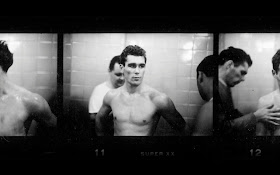From Photography to Film: Stanley Kubrick Enters the Ring
"Although Kubrick is regarded as the most critically and commercially successful photographer turned full-time feature filmmaker (and my personal favourite director), this mainstream acclaim might also be the reason his name rarely enters the discussion of the legendary New York-based photographers and their progressive contributions to avant garde and non-narrative filmmaking. This tradition includes Paul Strand (Manhatta, 1921), Rudy Burckhardt (The Pursuit of Happiness, 1940) Helen Levitt (In the Street, 1949), Ruth Orkin & Morris Engel (The Little Fugitive, 1953), William Klein (Broadway by Light, 1958) and Robert Frank (Pull My Daisy, 1959), among whose varying innovations include discrete handheld photography, examples of “life caught unawares,” and blurring lines between documentary and staged situations."[via Time Lightbox]
Read more: http://lightbox.time.com/2012/11/01/from-photography-to-film-stanley-kubrick-enters-the-ring/#ixzz2AzUcsvGk
Boxer Rocky Graziano (1919-1990), the greatest knockout artist in boxing history, photographed by filmmaker Stanley Kubrick.
I Highly recommend you watch this fascinating short film:
Thomas Rocco Barbella (1919 – 1990), better known as Rocky Graziano, was an American boxer. Graziano was considered one of the greatest knockout artists in boxing history, often displaying the capacity to take his opponent out with a single punch. He was ranked 23rd on The Ring magazine list of the greatest punchers of all time.

Rocky Graziano eating breakfast with his family.
Rocky Graziano playing cards with the boys
Stanley Kubrick (1928-1999).Rocky Graziano, He’s a Good Boy Now. Man applying petroleum jelly to Rocky Graziano.1949-1950.
Rocky Graziano exercising.
"Although Kubrick is regarded as the most critically and commercially successful photographer turned full-time feature filmmaker (and my personal favourite director), this mainstream acclaim might also be the reason his name rarely enters the discussion of the legendary New York-based photographers and their progressive contributions to avant garde and non-narrative filmmaking. This tradition includes Paul Strand (Manhatta, 1921), Rudy Burckhardt (The Pursuit of Happiness, 1940) Helen Levitt (In the Street, 1949), Ruth Orkin & Morris Engel (The Little Fugitive, 1953), William Klein (Broadway by Light, 1958) and Robert Frank (Pull My Daisy, 1959), among whose varying innovations include discrete handheld photography, examples of “life caught unawares,” and blurring lines between documentary and staged situations."[via Time Lightbox]
Read more: http://lightbox.time.com/2012/11/01/from-photography-to-film-stanley-kubrick-enters-the-ring/#ixzz2AzUcsvGk
Boxer Rocky Graziano (1919-1990), the greatest knockout artist in boxing history, photographed by filmmaker Stanley Kubrick.
I Highly recommend you watch this fascinating short film:
Thomas Rocco Barbella (1919 – 1990), better known as Rocky Graziano, was an American boxer. Graziano was considered one of the greatest knockout artists in boxing history, often displaying the capacity to take his opponent out with a single punch. He was ranked 23rd on The Ring magazine list of the greatest punchers of all time.

Rocky Graziano eating breakfast with his family.
Rocky Graziano playing cards with the boys
Stanley Kubrick (1928-1999).Rocky Graziano, He’s a Good Boy Now. Man applying petroleum jelly to Rocky Graziano.1949-1950.
Rocky Graziano exercising.
Stanley Kubrick's "Day of the Fight" - Part 1
Stanley Kubrick's Boxer photographs
Contact sheet from Kubrick's first film
Stanley Kubrick (1928-1999). Walter Cartier – Prizefighter of Greenwich Village Walter Cartier during a fight.1948.
Walter Cartier – Prizefighter of Greenwich Village Walter Cartier at a punching bag as Vincent Cartier and two other men watch.1948.
Walter Cartier eating in a restaurant and enjoying a good book. 1948
Walter Cartier was born in the Bronx in 1922. He started boxing with his brothers at an early age (his twin brother Vincent would later be his trainer) and after World War II gained prominence in boxing circles in New York City. At the time that Kubrick shot the LOOK story, Cartier was a 24-year old rising fighter, known for being a precise, smart, intense middleweight boxer. The article accompanying the photographs says that if, “the big purses elude him another year, he plans to quit the ring and attend law school.” But the big fights came and for years he was constantly on the cusp of becoming the middleweight champion. As an obituary reads, “Cartier was that handsome Bronx knockout kid who sold tickets. Here was a special kind of a fighter–clean living, loved being a boxer and always kept himself in shape.”
























No comments:
Post a Comment